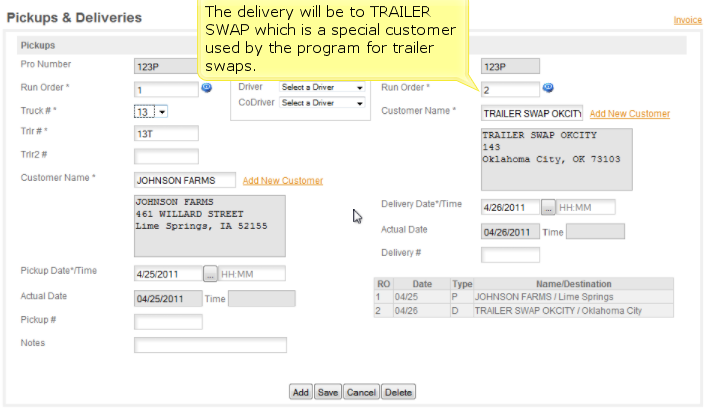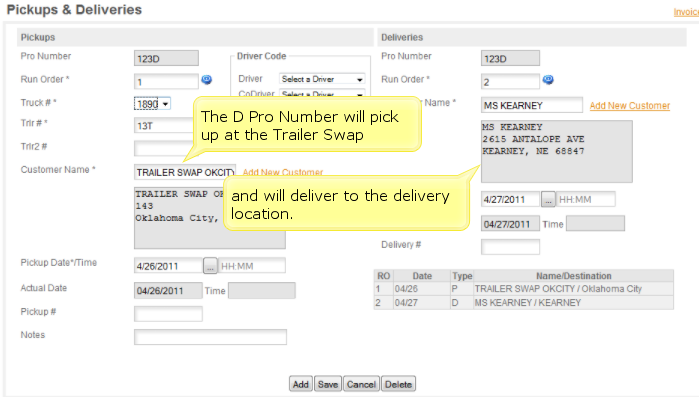Split Loads
LOADS - PICKUP & DELIVERY
A Split Load occurs when you have one truck pick the load up and another truck delivers it. This can be by design or can occur when a truck under a load breaks down. The program deals with this by using the letters P & D on the end of the Pro Number for the load. The program can also deal with multiple truck split loads by adding a second P or D to the Pro Number. We will explain this further later in this topic. In order to make this work you will need to follow the rules for SubPros which were discussed in the SubPro Topic so be sure to read that section as well as this one.
Finally, since not everyone wants to use SubPros or Split Loads and follow these rules you will need to turn SubPros on if you want to use them for LTL or Split Loads. This is also covered in the SubPro Topic
Now let's take a look at an actual Split Load.
For Billing you will enter each portion of the Split Load as a separate load. The program will create one invoice for the load but will treat the Pickup and Delivery as separate loads for dispatching and payroll.
You'll also want to enter the loads in the order they will occur. So you'll always start with P and the first Pickup for the load and finish with D and the final delivery. You will enter the Pickup just as you would for any other load. The delivery will be to TRAILER SWAP which is a special customer used by the program for trailer swaps.

Note: Trailer Swap will be used by the program to designate places where you do trailer swaps. We suggest naming them as TRAILER SWAP LOCATION where location is the name of the city where the trailer swap will occur. The program will allow you to have unlimited Trailer Swap locations.
Next you'll enter the delivery for the load which will be the same Pro Number with a 'D' at the end of it.

Note: for payroll, if you pay the drivers based on Billing information enter the appropriate information in each section of the load. The program will pay the P and D sections separately to the appropriate truck and driver. The invoice will combine the billing information from the P & D invoices and will only show the starting & ending locations. The trailer swaps will be omitted.
Note: if you have multiple pickups or deliveries just enter them like any other load. You can break the load at any point with a trailer swap and the program will dispatch it and pay it that way.
Let's say you have a load with 2 pickups and Truck 1 picks up the first stop and then breaks down. You would then insert a PP Pro Number for the truck that is going to pick up the load and finish taking it to the original Trailer Swap. So that load would run from Trailer Swap To Trailer Swap.
Note: if a truck breaks down on the delivery side of the trip, change his Pro Number to PP and enter a new Pro Number as the D side for the truck that will be making the final delivery. If a truck breaks down between deliveries change his Pro Number to DD and then create a new Pro Number for the truck that will make the final delivery as the D Pro Number. So the RULE is - the first pickup is always P and the final delivery is always D. If you have a 3rd truck it will be PP, or DD as the case may be.
Hint: Need to create a LTL Split Load? Check out the topic on Split-SubPros for help on how to do that. LOADS - PICKUP & DELIVERY
Split Loads